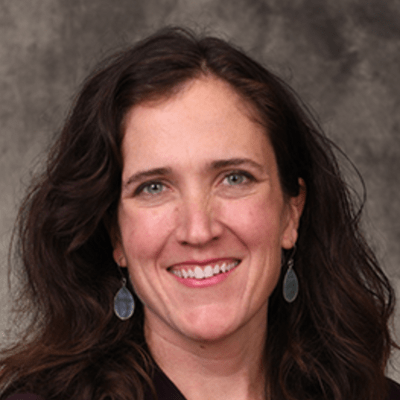Institutional Sustainability & Environmental Justice Strategy
Dr. Sarah Fortner is the Director of Sustainability at Carleton College providing leadership for the institutionalization of sustainability at Carleton College. Current work includes shaping the collaborative development of Carleton’s next climate action that will accelerate carbon neutrality, deepen sustainability academic opportunities for students, and support comprehensive action on campus and in our local and broader networks. She designs and supports collaboration to increase sustainability and environmental justice impacts. This includes leading more than 35 national workshops on interdisciplinary sustainability and environmental justice curriculum and program development reaching more than 1000 educators. She has also supported many earth, environmental and sustainability programs in planning how to strengthen their work and student success through site reviews, consultancy, and the NAGT Traveling Workshop.
Climate Change & Environmental Justice Expertise
Sarah has two decades of expertise in interdisciplinary climate and environmental justice research, education, and community engagement with a focus on applied climate and environmental justice research, sustainability curriculum, and community engaged programs. With interdisciplinary teams she co-creates research, education, and community engagement projects that support students, faculty, and the local community in collaboration for change. This includes leading an Engaged Sustainability, Across Curriculum & Community project at Wittenberg University as part of the NSF InTeGrate Project (Interdisciplinary Teaching about Earth for a Sustainable Future) in collaboration with the Science Education Resource Center at Carleton. As the former director of Environmental Science she supported scaling of campus and community engaged sustainability education and action projects that advanced water, land, and justice planning and decisions.
Sarah is a biogeochemist by training, working on glacier research and education at all latitudes with more than 20 field campaigns at all latitudes including work in the Taylor Valley Antartica, Cordillera Blanca, Peru, Oregon Cascades, Juneau Icefield, Alaska . She serves on the academic leadership team for the Juneau Icefield Research Program, the longest running undergraduate expeditionary experience building leadership in climate education.
Regional & National Service
Since joining the Carleton community in 2020, Sarah has initiated and co-led the Midwest Climate Collaborative (MCC) Educator Community of Practice, an action planning community with more than 200 members in K-12, university, nonprofit, and government educators working to develop Midwest specific climate education. She is also currently a member of the National Academies Sciences, Engineering, and Medicine (NASEM) Committee to Advise the U.S. Global Change Research Program (USGRP). Through this role, she provides advice informing the development of the USGRP Decadal Strategic Plan, the Fifth National Climate Assessment, and ongoing dissemination and strategic needs in the global change community. She also serves on the NASEM US National Committee for Geological Sciences building recognition and community for geoscience-society issues of international importance, especially sustainability and environmental justice.
Local Service
Sarah currently serves on the board and governance committee of Clean River Partners a nonprofit working for clean water and healthy soil in the Cannon River Watershed.
Recent Publications & Media Products
- PBS, 2022, Redlining: Mapping Inequality in Dayton & Springfield – ThinkTV (concept development & advisor to Emmy-award winning documentary)
- Hoffman-Hall, A., Gorris, M.E., Anenberg, Susan, Bredder, Allison E., Dhaliwal, J. K., Diaz, M.A., Fortner, S.K., McAdoo, B.G., Reano, D., Rehr, R C., Roop, H.A., Zaitchik, B.F. (2022). A GeoHealth Call to Action: Moving Beyond Identifying Environmental Injustices to Co-Creating Solutions. GeoHealth. https://agupubs.onlinelibrary.wiley.com/doi/full/10.1029/2022GH000706
- O’Reilly, C. M., Josek, T., Darner, R. D., & Fortner, S. K. (2022). Pedagogy of teaching with large datasets:Designing and implementing effective data‐based activities. Biochemistry and Molecular Biology Education. https://iubmb.onlinelibrary.wiley.com/doi/full/10.1002/bmb.21663
- Fortner, S.K., Manduca, C.A., Ali, H., Saup, C., Nyarko, S., Othus-Gault, S., Perera, V. Tong, V. H., Gold, A. U., Furman, T., Arthurs, L., Mulvey, B. K., St. John, K., Singley, J. G., Thomas Johnson, E., Witter, M., Batchelor, R., Carter, D., Damas, M. C., LeMay, L., Layou, K. M., Low, R., Wang, H.H., Olson-Sawyer, K.,Pallant, A., Ryker, K., Lukes, L., LaDue, N., van Hoeven Kraft, K. J. (2022). Geoscience Education Perspectives on Integrated, Coordinated, Open, Networked (ICON) Science, Earth and Space Science OpenArchive. https://agupubs.onlinelibrary.wiley.com/doi/full/10.1029/2022EA002298
- Barnard, M. A., Emani, S. R., Fortner, S. K., Haygood, L., Sun, Q., White‐Newsome, J. L., & Zaitchik, B. (2022). GeoHealth Perspectives on Integrated, Coordinated, Open, Networked (ICON) Science. Earth and Space Science, e2021EA002157. https://www.liebertpub.com/doi/full/10.1089/env.2021.0013
- Fortner, S.K., Scherer, H.H., Diaz, M.A., Brown, K.L., Fadem, C.M., Nezat, C.A., Latimer, J.C., Ebanks, S.C., and Landsbergen, K., (accepted). The Metal Redlining Network: Uniting Research, Education, and Community.The Handbook of Broader Impacts, eds. Van Egeren, L. and Renoe, S.
- Fortner, S.K., Suffoleta, M.*, Vogt, L*., Brown, A., Diaz, M. (2021). An undergraduate soil lead research and partnering model to address systemic racism and the legacy of redlining. Environmental Justice, Special Issue: 6th University of Maryland Environmental Justice and Health Disparities Symposium. https://www.liebertpub.com/doi/full/10.1089/env.2021.0013
At Carleton since 2021.
